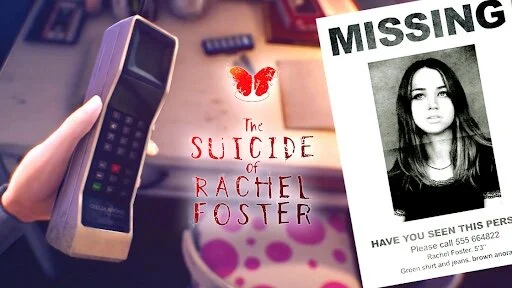The Suicide of Rachel foster features the first interactive suicide sequence I have ever encountered. I've been gaming since I was 5 years old and I remember looking around for an imaginary audience, thinking “is this really happening?” I'm not sure when the last time I was that floored by something.
The Suicide of Rachel Foster (PC, PS4 [reviewed], Xbox One)
Developer: One-O-One Games
Publisher: Daedalic Entertainment
Released: September 9, 2020 (console) February 19, 2020 (PC)
MSRP: $19.99 (console) $17.99 (Steam)
It's important to get this minor spoiler off my chest now. I know, I know. How many reviews start that way? You need to have this information because, despite some frustrating execution, Rachel Foster is really taking some interesting risks with its taboo subject matter.
I imagine this premise would have been an impossible sell to a AAA studio. So here's the pitch: You're stuck in an empty hotel...alone...in the middle of the Montana wilderness during a blizzard facing the demons of your past. What demons, you say? Well, your father had an affair with a 16-year-old girl named Rachel, who later committed suicide. Also, she was pregnant. The hotel featured in the game is owned by the player character (Nicole) and her family. You return to the abandoned hotel where you grew up, as an adult, to assess the condition and sell the property. One-O-One games have an emotional sledgehammer of a narrative premise to kick things off. I started the game around ten o’clock at night and the next several hours flew by. Before I knew it, it was three in the morning. I was staring mouth gaped, into my monitor as the closing credits scrolled by. Criticisms aside there is always something to be said for art that truly grips you and won't let go.
The gameplay unfolds as a first-person exploration/adventure game. The controls are simple but effective. You use the D-pad to cycle through your various key items and the trigger button to activate said item. You can interact with your environment by clicking on highlighted objects. A few sections of the game revolve around a clever gameplay mechanic or two. One involves using an EMF machine that tracks sound throughout the hotel to close in on a creepy noise source. Another involves using an old polaroid camera flash as an emergency flashlight of sorts.
In both cases, I found the gameplay gimmicks to be surprisingly effective. Eventually, they waned into tedium and frustration. For example, with the camera, the slow-building terror of navigating the darkened hotel hallways with only the occasional flash gave away into frustration as I got lost and found myself retracing my steps and checking the map over and over. From a design perspective, this is fascinating as it mimics the real-life experience of being lost in a dark hotel, but at some point, the value of that moment wore off as I became flustered and irritated.
Generally speaking, though I really felt like gameplay mechanics, including the creative decision to use a traditional old school map, works really well here. There are no glowing waypoints or flashing signs to guide your way, just the dusty old map of the hotel that makes you the player feel just as lost as Nicole should, considering she hasn't visited the hotel since her childhood.
The final revelations in the game worked for me, and in many ways made my second playthrough of the game more interesting. I found myself piecing together the clues knowing the final twists of the story. I wanted to make sure it all felt right to me once I had all the pieces laid out before me. The relationship between Nicole and Irving, a FEMA employee you talk to via phone to help navigate the hotel, is the heart of the story. Irving is the only other character you speak with throughout the story and the success or failure of the game hinges on their dialogue and chemistry. Neither the writing nor the voice acting is on par with something like Firewatch but, it gets the job done and there are absolutely some solid moments of character work. The story is very dark and disturbing, but the game trusts the player to handle the narratives lurid themes without shoving any ham-fisted morals or messages down your throat. This is the sort of game that you can't wait to talk with your friends and family about.
Verdict: The Suicide of Rachel Foster is the sort of experience that asks you how much execution you are willing to trade in service of experiencing something truly unique and unsettling. Most games that attempt to reach a higher level of player enlightenment don't achieve their grandest goals, but in this pursuit, they can still achieve something memorable. Despite its flaws, this is a game that gripped me until the very end. It rattled around in my brain like the broken shutter attached to the Timberland hotel, thrashing back and forth, in the midst of a violent blizzard. The execution on a gameplay level isn't quite as high as similar games like Firewatch or What Remains of Edith Finch, but the experience as a whole resonated with me more.
Buy it
Author: Morgan Barnes
[This review is based on a retail build of the game provided by the publisher]




